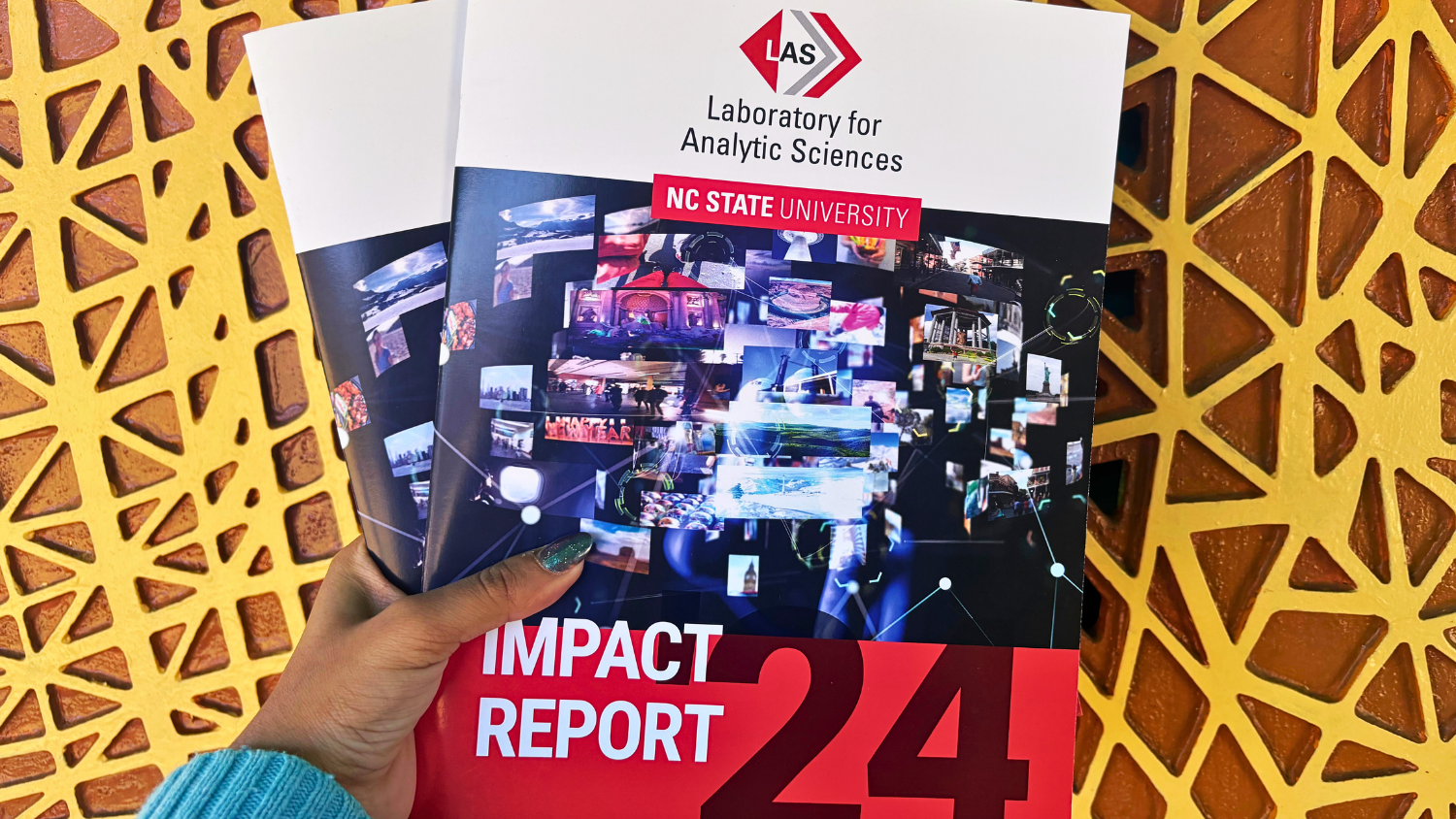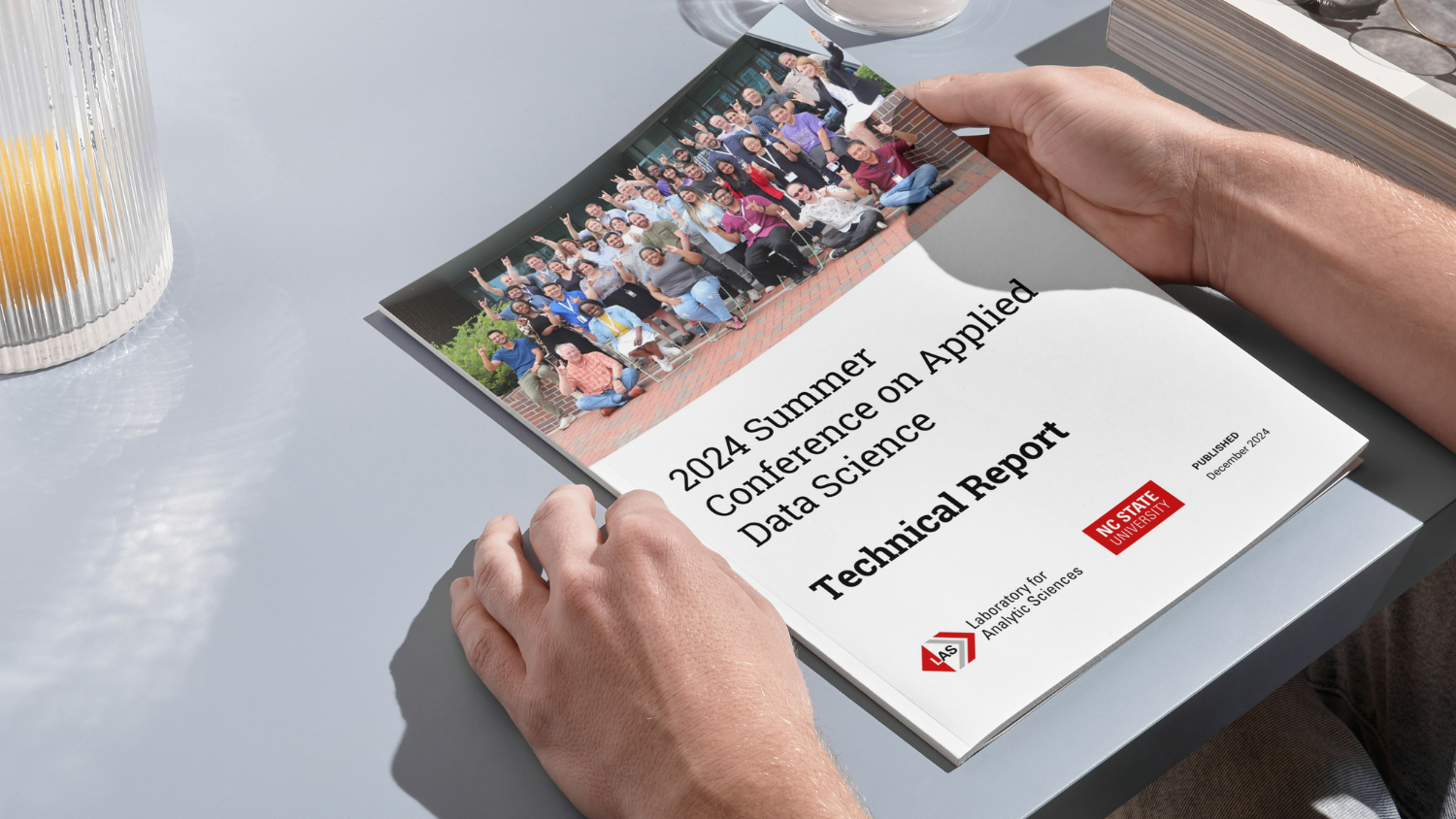LAS Senior Design Engagement
Since the mid-1990s, undergraduate students majoring in engineering and computer science at North Carolina State University (NCSU) have been required to complete a capstone research project during the final semester of their senior year. Students work in small teams to solve problems that are proposed and sponsored by area businesses and research organizations. Researchers at the Laboratory for Analytic Sciences (LAS) have sponsored senior design projects since 2016.
Problems sponsored by the LAS stem from mission needs in analytic technology and tradecraft. They often involve hot topics such as machine learning/artificial intelligence, knowledge graphs, natural language processing, and complicated, large scale, big data, computer science innovation. Solutions developed by the students with LAS researchers’ guidance are subsequently integrated into analytic production systems to impact real-life mission needs.
Beyond the minor costs of physical resources required (e.g. development/ computation equipment), no funding is exchanged through this engagement. Instead, the engagement sits at the nexus of the interests of all parties involved, creating a “win-win-win” situation. The LAS benefits from the fresh thinking of a team of bright young STEM minds working on a problem-of-interest to the LAS mission; the university lives up to its goal of providing students top-tier, hands-on, learning opportunities; and the students benefit from the experience of working on real, non-textbook, problems, with professional mentorship and collaboration. Furthermore, recruitment and networking opportunities occur naturally, and the LAS gets the outreach opportunity to contribute to the development of the next generation of STEM talent.
When Jose Q., an NCSU Computer Science alum, was asked about his experiences working with LAS researchers on his Senior Design project in 2021, he stated:
“I had a really positive experience doing my senior design project with the LAS team. My team had a challenging project to work on, but with the resources and advice from both the NCSU Senior Design Center staff and the LAS staff, we were able to work through the problems we encountered. This senior design project exposed me to a lot of new technologies I had never used in classes before (NoSQL databases and Docker container for example), which gave me valuable experience. Finally, I developed a good working relationship with the LAS team, and ended up interning with them after graduating, which has also been a very positive experience.”

Although the LAS originally only sponsored computer science projects, the many successful outcomes led the lab to expand the scope of this engagement to include additional departments and courses. To date, the LAS has sponsored 13 projects in the NCSU Computer Science Department, one in the NCSU Electrical Engineering Department, and two in the NCSU Graduate Graphic Design Department. The LAS has also developed a proposal for a putative Mechanical Engineering project (currently on hold due to COVID) and run a design-focused project through a computer science course which focuses on studying Human-Computer Interactions. The LAS has also worked with students from NCSU’s Poole College of Management, mentored a team in the NCSU Hacking For Defense course, and sponsored a senior capstone project at NC A&T University in Greensboro. The LAS participation in all of these programs has made meaningful contributions to both the LAS mission and the careers of over 100 young professionals.
A full accounting of all of these projects is beyond the scope of this article, but brief descriptions are provided below. As an example, a video describing one of these projects, the Spring 2020 project on Labeling Gamification (Number 9 in the list below), is available. For more information, please see the NCSU CS Senior Design Center website, and please contact the LAS for more details about any of the below projects or to learn about potentially becoming involved.
Chronological Project List:
- NCSU Computer Science, Spring 2016: “Multiple Hypothesis Tracking” – The team implemented, and experimented with, cutting-edge research methods into object tracking. A canonical application example is that of identifying/labeling aircraft across multiple snapshots in the airspace, where the time difference between snapshots is large enough to create confusion and probabilistic measures must be employed.
- NCSU Computer Science, Spring 2017: “Pigfarm” – The team implemented, and successfully tested, an idea to merge unassociated Apache Pig scripts having similar load statements to improve the overall efficiency of a map-reduce cloud compute system. Such efficiency increases enable cloud analytics to run faster and/or more frequently across the entire system, supplying knowledge workers with more timely information and/or reducing computational costs.
- NCSU Poole College of Management, Fall 2017: “Assessing Decision making” – The student team created an opportunity to asses decision-making in an environment where decision-makers have a set of prototype tools at their disposal.
- NCSU Computer Science, Spring 2018: “Tuningwolf” – The team implemented, and successfully tested, an idea and approach to optimization of map-reduce configurations for scheduled jobs on cloud compute systems. Results proved very successful, especially in cases of poorly tuned jobs, and were implemented on production systems. Benefits offered are similar to those in the Pigfarm project description above.
- NCSU Computer Science, Spring 2019: “Cloud Analytic Schedule Optimization” – The team created an algorithm that optimizes the schedule of cloud analytics with periodic run-time requirements (e.g. once daily) against any “load curve” the system owners desire. Using this research, system owners can process periodic cloud analytics on a schedule that meets the requirements, but that also distributes the load in a beneficial manner.
- NCSU Electrical Engineering, Fall 2019: “Health Status Monitoring for High Performance Computing (HPC)” – A team of electrical engineering students devised and implemented a method of monitoring the health of high performance compute chips. Should an individual processor exhibit dangerous signals (begin to overheat, experience excessive voltage, etc), warnings and actions will take place to prevent catastrophic events which can and do occur in HPC systems.
- NCSU Computer Science, Spring 2020: “Labeling Gamification” – The team gamified a data labeling application for machine learning developers called Infinitypool (see additional posts from the LAS about Infinitypool!). The task of data labeling (a pre-requisite to supervised machine learning development) is often tedious and somewhat unrewarding for volunteers. Using concepts from “idle games” and “incremental games”, which are extremely popular on mobile devices, the team’s product creates a sense of competition among data labelers making the task more enjoyable (and perhaps slightly addictive!). Watch video
- NCSU Computer Science, Fall 2020: “Data Estimation” – The team created a method of estimating the quantity of data a given cloud analytic will have to process immediately prior to run-time, and using that information to inform resource allocation on the cloud system. Significant efficiency increases resulted, offering benefits similar to those in the description of the Pigfarm project above.
- NCSU Computer Science, Spring 2021: “Data Pipeline Monitoring” – The team developed a web application enabling system managers of big data systems to inspect the dynamics and status of the data flows in custom and granular manners. Users can write, upload, execute, schedule, and manage custom scripts, and visualize results all within the application.
- NCSU Computer Science, Spring 2021: “Seinfeld Knowledge Graph Generation” – Using transcripts from the television program Seinfeld, the team researched, utilized, and created cutting-edge natural language processing methods to process dialogue text into a knowledge graph. This could enable a future team to develop a variety of applications over the dialogue information. For example, a Q&A engine could be developed to allow users to ask questions of the data (e.g. “Who is K-Man and where does he live?” -> “K-Man is an alias for Kramer, who lives in New York”).
- NCSU Computer Science, Spring 2021 (HCI): “Dialogue Exploration Application” – Two teams of students in the NCSU Human Computer Interaction course applied modern application design methodologies and user group experimentation/feedback to create effective designs for a web application that enables users to explore dialogue information. The teams also used transcripts from the television program Seinfeld and a prototype implementation provided by LAS researchers as a basis of exploration.
- NCSU Graduate Graphic Design, Spring 2021: “Empowering Investigation with Knowledge Graphs” – Students were posed the question “How might the design of an intelligent knowledge graph enable an analyst to collaborate with the graph to understand relevant data and forge useful insights?” Students designed a mock prototype system and created a demonstration portraying how an analyst may use such a system to investigate large datasets with the help of underlying AI technologies.
- NCSU Computer Science, Fall 2021: “Model Registry” – The team created an application for managing data sets, labels, and trained machine learning models for developers and managers. The process data scientists go through to develop and maintain models can be very messy/unwieldy, and difficult to understand, especially after time passes. The registry prototype developed by the team assists the AI/ML developers and users in this organization and understanding.
- NCSU Graduate Graphic Design, Spring 2022: “Concepts of a ‘Tailored Daily Report’ (TLDR)” – Students were first presented material about the basic vision of a TLDR, the development of which is the Grand Challenge of the LAS Summer Conference on Applied Data Science (see SCADS for more info). They were then posed the questions “What might a TLDR interface look like, and how might users interact with the capability?” Students designed three separate concepts addressing these questions, all of which are incredibly innovative and continue to influence the direction of the LAS SCADS event.
- NCSU Computer Science, Spring 2022: “Knowledge Graph From Nixon Tapes/Diary” – The student team took the famous White House recordings from the Richard Nixon presidency, along with the Presidential Daily Diary which is an accounting of the President’s whereabouts and company at a very granular level, and generated a knowledge graph representation of the combined data. The combined knowledge graph, at least theoretically, supports follow-on capabilities that can help analysts answer questions involving both types of data. For example, in what room is the President typically when he speaks about China, and who is he with? This was an extremely difficult project, involving complicated technologies beyond just knowledge graphs (i.e. natural language processing). However the team pulled it off, and this knowledge graph is now available to use for additional LAS research projects, including SCADS.
- NCSU Computer Science, Spring 2022: “Knowledge Graph From Nixon Tapes/Vocals” – This project is very similar to the previous project above, the difference being that this team enriched the knowledge graph of the recordings with vocal characteristics rather than the Presidential Daily Diary. The combined knowledge graph can now, at least in theory, be used to support capabilities that can answer very interesting analysis questions. For example, what are some topics that the President is talking about when his voice sounds emotional? This knowledge graph is also now available to benefit additional LAS research projects, including SCADS.
- NCSU Computer Science, Fall 2023: “AWS Interface Development” – Current Project – The team is currently working to improve an interface in to Amazon Web Servides, which was developed previously by the LAS. This makes it easier for developers to manage their AWS resources, which can be more complicated than necessary for the majority of uses/users.
- NCSU Computer Science, Fall 2023: “Machine Learning Pre-Annotation Service” – Current Project – The student team is developing a pre-annotation for the LAS-developed labeling tool Infinitypool (see additional posts about Infinitypool!). This service is expected to enable data labeling volunteers the ability to have the data pre-labeled by an existing machine-learning model. In this way, labelers will only have to confirm, or modify, a pre-label to complete the labeling of any particular piece of data. Studies have shown that this significantly speeds up the labeling process, and may also improve the labeling accuracy.
- Categories:


